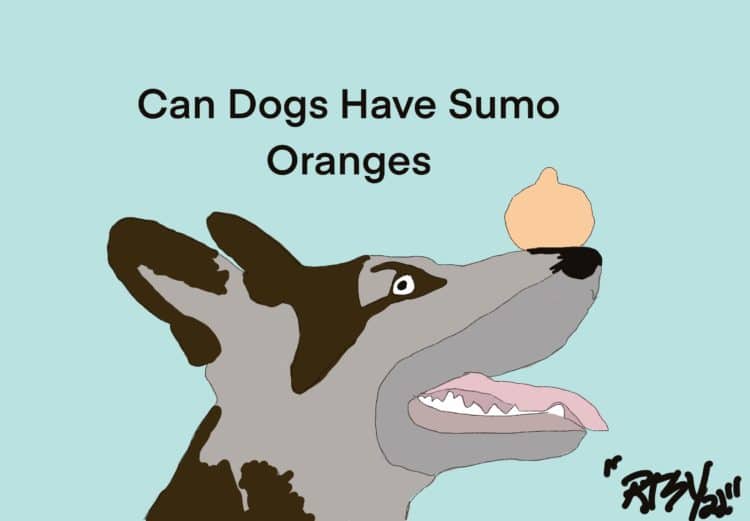Sweet and tasty oranges — including the extra-sweet sumo orange — are decidedly healthy and nutritious for human beings. But what about for dogs? Can dogs have sumo oranges?
Table of Contents
What Is a Sumo Orange?
Let’s begin with the basics: What is a sumo orange?
Sumo oranges (also called dekopons) are seedless citrus fruits in the satsuma orange family. The sumo orange was actually “created” or bred by humans in the 1970s. The hybrid of the sumo orange is a cross between a sweet orange mandarin and a honey orange. “Dekopon” was the initial brand name of the fruit in Japan.
Sumo oranges are notable for their “top knot”, so if you’re looking to buy some, look for that at the grocery store or farmer’s market. People tend to love sumo oranges for their large size, juicy sweetness, and lack of mess when peeling. They also don’t have seeds, which is always a bonus, and they are easy to peel.
Can Dogs Have Sumo Oranges?
Yes. Like most other citrus fruits, sumo oranges are okay for dogs to eat. In fact, sumo oranges can even be good for your dog. Key vitamins and nutrients in sumo oranges can provide a range of benefits. For example:
Fiber aids the gut. As with humans, the gut in dogs is vital to many bodily systems. A healthy gut means less inflammation, which means less illness. Giving your dog enough fiber means that their gut microbiome will be more balanced, and they’ll also have more regulated bowels. If you have a dog that struggles with gas or other colon- and bowel-related issues, more fiber by way of sumo oranges could help.
Vitamin C is an antioxidant that can bolster your dog’s immune system and help them avoid illness and disease.
Potassium aids the kidneys and promotes a healthy digestive system in dogs. It’s also good for the heart and muscles.
Situations you should not give your dog sumo oranges:
If they have diabetes.
Sumo oranges can be healthy, but they also have a lot of sugar in them — as do all fruits. For diabetic dogs, this means you’ll want to limit them.
If they are overweight.
As stated above, sumo oranges have a substantial amount of sugar in them. If your dog is overweight, which can be unhealthy overally, you’ll want to avoid giving them too many sumo oranges as this can add to their weight problem.
If they show signs of distress after eating sumo oranges.
Some dogs may react badly to sumo oranges. If your dog seems excessively tired or experiences severe gas, nausea, vomiting, or diarrhea after eating sumo oranges, you’ll obviously want to discontinue providing them.
If they’ve eaten a lot of sumo oranges already.
As with any food, don’t give your dog too many sumo oranges. One or two is fine if your dog likes them, but don’t let your dog eat more than that at one time.
You should also avoid giving dogs the sumo orange peel. Like other fruit coverings (banana peels, watermelon rind, etc.), orange peel can cause digestive distress for your dog. This is mostly because the peel contains a large amount of fiber. Fortunately, most dogs will not be interested in the peel because of its strong scent anyway.
Can Dogs Eat Oranges?
Yes, basically any type of orange is fine for dogs to eat. Just be sure to follow the guidance listed above.
Don’t give your dog oranges if they have diabetes, are overweight, or have symptoms such as lethargy, vomiting, or diarrhea, etc. after eating oranges.
Sumo oranges don’t have seeds, but because other types of oranges and citrus fruits do have seeds, be sure to avoid giving those to your dog as well. Citrus seeds have trace amounts of cyanide in them, which can be harmful to dogs.
We love to answer your questions about what dogs should and should not eat. Can dogs eat grapes? Can dogs eat corn starch? Can dogs have chocolate? Can they have nuts? We’re here to answer all of them. Learn more about keeping your dog healthy and happy by staying up-to-date with the Rootsy Living blog!

